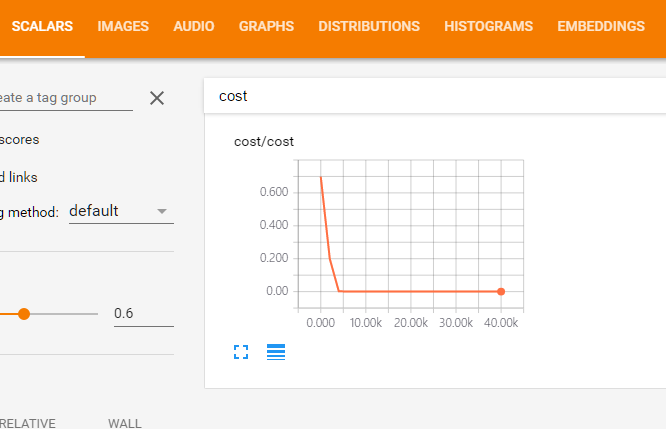import numpy as np
import tensorflow as tf
xy = np.loadtxt('train.txt', unpack=True)
x_data = np.transpose(xy[0:-1])
y_data = np.reshape(xy[-1],(4,1))
X = tf.placeholder(tf.float32, name='X-input')
Y = tf.placeholder(tf.float32, name='Y-input')
# define 2 layer Neural Network - we will use 3 layers.
W1 = tf.Variable(tf.random_uniform([2,10], -1.0, 1.0), name="W1")
W2 = tf.Variable(tf.random_uniform([10,10], -1.0, 1.0), name="W2")
W3 = tf.Variable(tf.random_uniform([10,10], -1.0, 1.0), name="W3")
W4 = tf.Variable(tf.random_uniform([10,1], -1.0, 1.0), name="W4")
b1 = tf.Variable(tf.zeros([10]), name="Bias1")
b2 = tf.Variable(tf.zeros([10]), name="Bias2")
b3 = tf.Variable(tf.zeros([10]), name="Bias3")
b4 = tf.Variable(tf.zeros([1]), name="Bias4")
# Draw histograms
w1_hist = tf.summary.histogram("weight1", W1)
w2_hist = tf.summary.histogram("weight2", W2)
w3_hist = tf.summary.histogram("weight3", W3)
w4_hist = tf.summary.histogram("weight4", W4)
b1_hist = tf.summary.histogram("biases1", b1)
b2_hist = tf.summary.histogram("biases2", b2)
b3_hist = tf.summary.histogram("biases3", b3)
b4_hist = tf.summary.histogram("biases4", b4)
y_hist = tf.summary.histogram("y", Y)
# Our hypothesis
with tf.name_scope("layer2") as scope:
L2 = tf.sigmoid(tf.matmul(X, W1) + b1)
with tf.name_scope("layer3") as scope:
L3 = tf.sigmoid(tf.matmul(L2, W2) + b2)
with tf.name_scope("layer4") as scope:
L4 = tf.sigmoid(tf.matmul(L3, W3) + b2)
with tf.name_scope("layer5") as scope:
hypothesis = tf.sigmoid(tf.matmul(L4, W4) + b4)
with tf.name_scope("cost") as scope:
cost = -tf.reduce_mean(Y*tf.log(hypothesis) + (1-Y)*tf.log(1-hypothesis))
cost_sum = tf.summary.scalar("cost", cost)
# Cross entropy cost function
with tf.name_scope("train") as scope:
optimizer = tf.train.GradientDescentOptimizer(0.3)
train = optimizer.minimize(cost)
with tf.Session() as sess:
merged = tf.summary.merge_all()
writer = tf.summary.FileWriter("logs/xor_logs" , sess.graph)
tf.global_variables_initializer().run()
for step in range(40001):
sess.run(train, feed_dict={X:x_data, Y:y_data})
if step % 2000 == 0:
summary, _ = sess.run( [merged, train], feed_dict={X:x_data, Y:y_data})
writer.add_summary(summary, step)
correct = tf.equal( tf.floor(hypothesis+0.5), Y)
accuracy = tf.reduce_mean(tf.cast( correct, "float" ) )
# Check accuracy
print( sess.run( [hypothesis, tf.floor(hypothesis+0.5), correct, accuracy],
feed_dict={X:x_data, Y:y_data}) )
print( "Accuracy:", accuracy.eval({X:x_data, Y:y_data}) )
>>
[array([[ 4.49579493e-05],
[ 9.99918222e-01],
[ 9.99936581e-01],
[ 8.82414679e-05]], dtype=float32), array([[ 0.],
[ 1.],
[ 1.],
[ 0.]], dtype=float32), array([[ True],
[ True],
[ True],
[ True]], dtype=bool), 1.0]
Accuracy: 1.0
